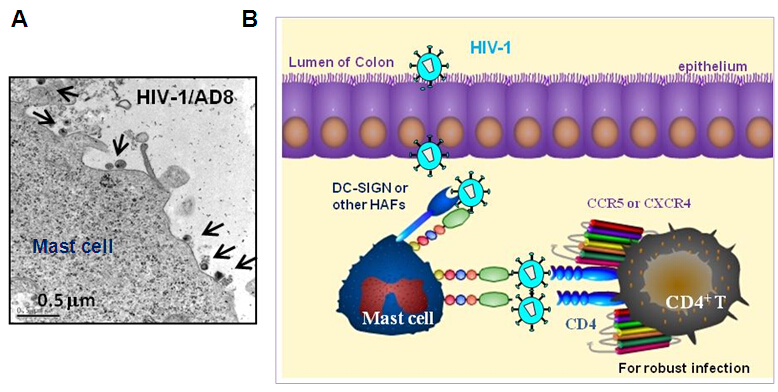On December 30, 2015, the Journal of Virology published an advanced research work, entitled “Human mucosal mast cells capture HIV-1 and mediate viral trans-infection of CD4+ T cells”, from Jian-Hua WANG`s Lab, Institute Pasteur of Shanghai, Chinese Academy of Sciences. This work reveals a novel mechanism of HIV-1 mucosal infection (sexual transmission).
Sexual transmission is the principal route of HIV-1 acquisition, making genital, oral and rectal mucosa the major sites of viral transmission. The mechanisms contributing to HIV-1 mucosal infection remain largely unexplored, and host cells located in submucosal tissues (such as dendritic cells and macrophages) have been reported to capture HIV-1, subsequently migrating to lymph nodes for local and systemic viral spread, which suggests the double-sworded roles of these immune cells in HIV-1 infection. Strategies aimed at preventing cell-associated viral dissemination could be beneficial in combating primary HIV-1 infection. Previous works of this lab have systemically clarified the molecular mechanisms of dendritic cell-mediated HIV-1 trans-infection. The current study reveals that mast cells in gut submucosal tissues can also capture HIV-1 and efficiently transfer these cell surface bound viruses to encountered CD4+ T cells, thereby facilitating viral trans-infection.
Mast cells are remained in close contact with the host-environment interface, such as the skin, airway, gastrointestinal tract, genital tract mucosa, etc. Mast cells are among the first cells to encounter invasive pathogens or allergens. The best well-known role of mast cells is participating in allergy and asthma. Accumulating reports have described the crucial roles of mast cells in regulating innate and adaptive immune responses for fighting against invading pathogens such as bacteria, fungi, parasites, viruses, etc. The role of mast cells in HIV-1 infection is poorly defined. The genital mucosa in HIV-infected women showed increased mast cell density, suggesting a potential role for mast cells in HIV-1 infection.
Ph.D. candidate Ai-Ping JIANG and the research assistant Jin-Feng JIANG, supervised by Prof. Jian-Hua WANG and collaborated with the First Affiliated Hospital of Nanjing Medical University, Shanghai 6th People′s Hospital, Shanghai Public Health Clinical Center Affiliated with Fudan University, and Tulane National Primate Research Center, USA, purified mast cells from mucosal sites adjacent to excised colorectal carcinoma, and investigated their interaction with HIV-1. The results demonstrate that mast cells express HIV-1 (co-) receptors to support productive infection; Intriguingly, mast cells express multiple HIV-1 attachment factors DC-SIGN, α4β7 integrins and heparan sulfate, for mediating HIV-1 capture and spread to CD4+ T cells, thereby facilitating viral dissemination. This study reveals a novel role of mast cells in HIV-1 mucosal infection, facilitating the strategy development to combat HIV-1 mucosal infection.
This project is funded by grants from CAS, the Natural Science Foundation of China, and the National Grand Program on Key Infectious Disease.

Figure. Mucosal mast cell-mediated HIV-1 capture and trans-infection of CD4+ T cells. (A) Mast cells capture HIV-1, visualized under TEM; The arrows indicate virus particles. (B)The scheme for mast cell-mediated HIV-1 trans-infection of CD4+ T cells, at the gut mucosa.
Links:http://jvi.asm.org/content/early/2015/12/28/JVI.03008-15.long
Contact:Jianhua Wang
Affiliated institutions: Institute Pasteur of Shanghai
E-mail: jh_wang@sibs.ac.cn
Phone: 021-54923120

